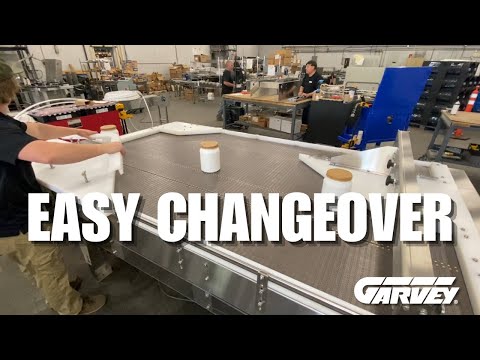Welcome to Package This — your guide to packaging machinery and materials. Today, let’s look at the ultimate buffering systems in packaging: accumulators.
Accumulation systems are the hidden heroes that keep bottling, filling, and other packaging lines running smoothly. Not only do they work hard during packaging line slowdowns or stoppages, but they also protect containers of all shapes and sizes from jams and damage.
Accumulation Tables/Conveyors
Product lines demand perfect timing, making reliable accumulation essential. That’s where accumulation tables and conveyors come in, like these systems from Span Tech.
These accumulation conveyors eliminate jams and keep products moving with zero back pressure, meaning items don’t touch each other while moving, avoiding pressure buildup that can cause damage to product.
Span Tech builds systems to fit the specific processes, spaces, and products of the customer — from curves and vertical lifts to custom layouts – no matter how unique.
With intelligent product control and easy integration, Span Tech accumulators help reduce downtime and increase throughput day in and day out. These systems are designed for smart accumulation and smoother flow, ultimately delivering fewer headaches for the brand.
Rotary Accumulators
Now, let's spin over to rotary accumulators, also known as turntable accumulators and rotary overflow tables, like these from Garvey.
Garvey's rotary tables provide seamless accumulation and buffering — keeping bottles and vials moving on liquid filling lines, even when downstream processes slow down.
Whether the application is high-speed bottling, packaging, or assembly, Garvey’s systems are built with precision and durability in mind. These tables feature stainless steel construction for long-lasting performance, smooth and quiet operation, plus customizable diameters and configurations to fit specific spaces and applications.
Garvey designs its systems for operator simplicity, reduced downtime, and increased output, and says brand customer maintenance teams appreciate the reliability of their tables.
Spiral/Helical Accumulators
Let's move onward and upward to our next type of accumulator: spiral and helical accumulators. Like the name suggests, these machines elevate containers or packages in a spiral or helical manner. Think of them as the circulating escalators of the production line, reducing stops and protecting products from damage along the way.
These machines could be used on high-volume bottle filling lines, keeping packages safely buffered between machines, or to buffer finished and sealed cases.
Vertical Accumulators
Finally, there's a highly unique accumulation system: vertical accumulators. First, they align rows of cartons horizontally and then stack them vertically, one row at a time. Ideal for high-volume lines and delicate products, they step in when there's a downstream hiccup, holding rows of cartons until everything's back on track. Then, they gently release the cartons back onto the conveyor to wherever they need to go next.
We hope you accumulated a little industry knowledge of these critical systems used daily by today’s top brands. Accumulation systems may differ in approach, but all do a fantastic job of keeping products flowing smoothly and safely throughout the packaging line.
For more videos on packaging machinery and materials, please subscribe to Packaging World’s YouTube channel and check out the Package This playlist. And for a deeper dive into these and other packaging solutions, go to ProSource.org, the most complete online directory of packaging and processing suppliers in North America.
Until next time, thanks for watching, and keep on packaging!































